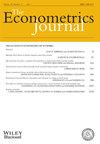模糊回归不连续性设计的Wild Bootstrap:获得稳健的偏差校正置信区间
IF 7
4区 经济学
Q1 ECONOMICS
引用次数: 9
摘要
本文提出了一种新的野自举方法来构造模糊回归不连续设计的鲁棒偏差校正有效置信区间,为现有的鲁棒偏差校正方法提供了一种直观的补充。该程序生成的置信区间在类似Calonico等(2014)及相关文献提出的程序的条件下是有效的。模拟证明,当应用于各种具有内生性和聚类特征的数据生成过程时,这种新方法至少与插入式分析修正一样准确。最后,我们通过回顾Angrist和Lavy(1999)对班级规模对学生成绩的分析来证明其实证相关性。本文章由计算机程序翻译,如有差异,请以英文原文为准。
Wild Bootstrap for Fuzzy Regression Discontinuity Designs: Obtaining Robust Bias-Corrected Confidence Intervals
This paper develops a novel wild bootstrap procedure to construct robust bias-corrected valid confidence intervals for fuzzy regression discontinuity designs, providing an intuitive complement to existing robust bias-corrected methods. The confidence intervals generated by this procedure are valid under conditions similar to the procedures proposed by Calonico et al. (2014) and related literature. Simulations provide evidence that this new method is at least as accurate as the plug-in analytical corrections when applied to a variety of data-generating processes featuring endogeneity and clustering. Finally, we demonstrate its empirical relevance by revisiting Angrist and Lavy (1999) analysis of class size on student outcomes.
求助全文
通过发布文献求助,成功后即可免费获取论文全文。
去求助
来源期刊

Econometrics Journal
管理科学-数学跨学科应用
CiteScore
4.20
自引率
5.30%
发文量
25
审稿时长
>12 weeks
期刊介绍:
The Econometrics Journal was established in 1998 by the Royal Economic Society with the aim of creating a top international field journal for the publication of econometric research with a standard of intellectual rigour and academic standing similar to those of the pre-existing top field journals in econometrics. The Econometrics Journal is committed to publishing first-class papers in macro-, micro- and financial econometrics. It is a general journal for econometric research open to all areas of econometrics, whether applied, computational, methodological or theoretical contributions.
 求助内容:
求助内容: 应助结果提醒方式:
应助结果提醒方式:


